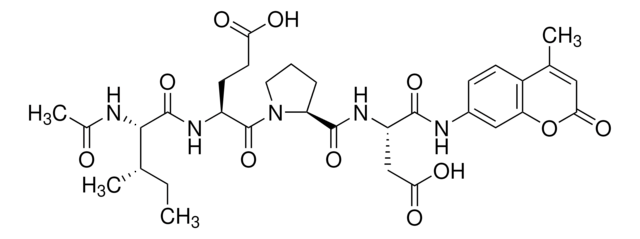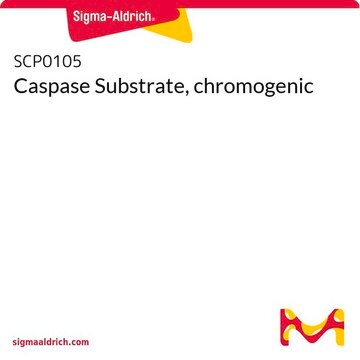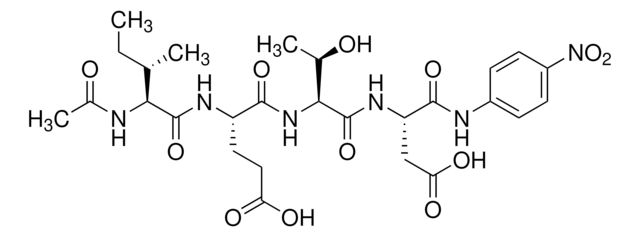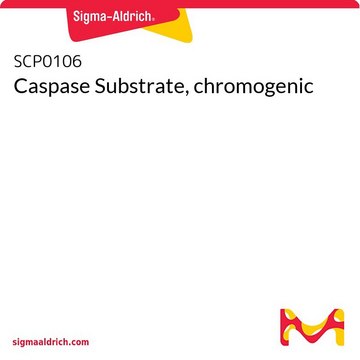SCP0077
Caspase 2 Substrate (ICH-1), chromogenic
≥90% (HPLC), lyophilized
Anmeldenzur Ansicht organisationsspezifischer und vertraglich vereinbarter Preise
Alle Fotos(1)
About This Item
Empirische Formel (Hill-System):
C29H41N7O12
Molekulargewicht:
679.68
UNSPSC-Code:
12352202
NACRES:
NA.32
Empfohlene Produkte
product name
Caspase 2 Substrate (ICH-1), chromogenic, ≥90% (HPLC)
Assay
≥90% (HPLC)
Form
lyophilized
Zusammensetzung
Peptide Content, ≥75%
Lagerbedingungen
protect from light
Lagertemp.
−20°C
Amino Acid Sequence
Ac-Val-Asp-Val-Ala-Asp-pNA
Anwendung
Caspase 2 is a cysteine protease that is potentially involved in cell cycle regulation and tumour suppression may be detected using peptides that contain the pentapeptide VDVAD such as the chromogenic and fluorogenic substrates: Ac-VDVAD-pNa (Acetyl-Val-Asp-Val-Ala-Asp-p- nitroanalide), chromogenic and MCA-VDVADGW-DNP-K-NH2, fluorogenic.
Lagerklassenschlüssel
11 - Combustible Solids
WGK
WGK 3
Flammpunkt (°F)
Not applicable
Flammpunkt (°C)
Not applicable
Analysenzertifikate (COA)
Suchen Sie nach Analysenzertifikate (COA), indem Sie die Lot-/Chargennummer des Produkts eingeben. Lot- und Chargennummern sind auf dem Produktetikett hinter den Wörtern ‘Lot’ oder ‘Batch’ (Lot oder Charge) zu finden.
Besitzen Sie dieses Produkt bereits?
In der Dokumentenbibliothek finden Sie die Dokumentation zu den Produkten, die Sie kürzlich erworben haben.
Structural and enzymatic insights into caspase-2 protein substrate recognition and catalysis.
Tang Y, Wells JA, Arkin MR.
The Journal of Biological Chemistry, 286, 31147-34154 (2011)
Tanja Kitevska et al.
Apoptosis : an international journal on programmed cell death, 14(7), 829-848 (2009-05-30)
The caspases are an evolutionarily conserved family of cysteine proteases, with essential roles in apoptosis or inflammation. Caspase-2 was the second caspase to be cloned and it resembles the prototypical nematode caspase CED-3 more closely than any other mammalian protein.
Unser Team von Wissenschaftlern verfügt über Erfahrung in allen Forschungsbereichen einschließlich Life Science, Materialwissenschaften, chemischer Synthese, Chromatographie, Analytik und vielen mehr..
Setzen Sie sich mit dem technischen Dienst in Verbindung.







